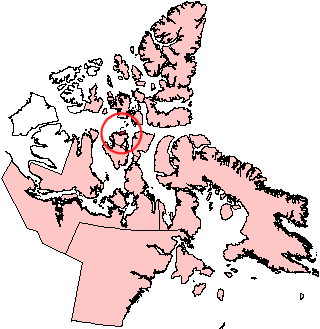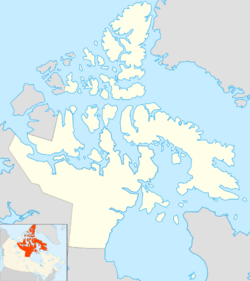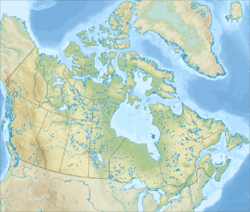Russell Island (Nunavut) facts for kids
 |
|
| Geography | |
|---|---|
| Location | Parry Channel |
| Coordinates | 74°00′N 98°25′W / 74.000°N 98.417°W |
| Archipelago | Canadian Arctic Archipelago |
| Area | 940 km2 (360 sq mi) |
| Highest elevation | 240 m (790 ft) |
| Administration | |
|
Canada
|
|
| Territory | Nunavut |
| Region | Qikiqtaaluk |
| Demographics | |
| Population | Uninhabited |
Russell Island is a large island in Canada. It is part of the Canadian Arctic Archipelago, a group of islands in the far north. This island is located in the Qikiqtaaluk Region of Nunavut, a territory in Canada.
Russell Island is an uninhabited island. This means that no people live there permanently. It is found in the Parry Channel, a waterway in the Arctic Ocean.
Contents
Where Is Russell Island?
Russell Island is located in the Parry Channel. It is very close to the northern tip of Prince of Wales Island. A narrow stretch of water called the Baring Channel separates these two islands.
The island itself has an interesting shape. A long, narrow lake runs through it, almost cutting it into two parts. These two parts are connected by a small strip of land. This strip is called an isthmus. It is only about 1.1 kilometers (0.7 miles) wide.
Size and Importance
Russell Island covers a total area of 940 square kilometers (363 square miles). This makes it the largest island located off the coast of Prince of Wales Island. Its size is similar to many large cities or small countries.
Who Discovered Russell Island?
The first European to see Russell Island was William Edward Parry. He was a British Arctic explorer. Parry sighted the island in 1819 during one of his expeditions. He was exploring the Arctic looking for the Northwest Passage.
Other Islands Named Russell
It is important to know that there are other islands also named Russell Island.
- One much smaller Russell Island is located near the northwest tip of Devon Island.
- Another Russell Island can be found in the West Foxe Islands. These islands are in the Hudson Strait, southwest of Alareak Island.
See also
 In Spanish: Isla Russell para niños
In Spanish: Isla Russell para niños
 | Percy Lavon Julian |
 | Katherine Johnson |
 | George Washington Carver |
 | Annie Easley |



